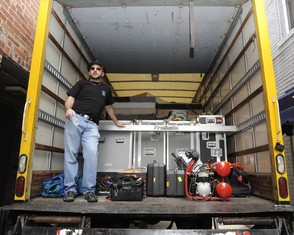

Robert Wills has been in charge of an army of audio engineers since the beginning of the Rhythm & Roots Reunion. (Earl Neikirk | Bristol Herald Courier)
*** Published Friday, Sept 17 in the Bristol Herald Courier. ***
Robert Wills neither sings nor plays a musical instrument, but he might just be the most important person at this weekend's Rhythm & Roots Reunion.
That's because Wills, a Twin City native now living in Chattanooga, Tenn., supervises a 50-person crew that will set up, operate and take down more than $1 million worth of audio and lighting equipment that will be used to entertain the thousands of music fans expected to descend on the Twin City for the festival, which starts tonight and ends Sunday.
"Everything that's tech production is me, so when it sucks it's my fault," Wills said Thursday.
Before dawn today, Wills and his crew began what is typically a weekend of minimal sleep, setting up 20 outdoor and indoor stages. The first acts are scheduled to go on at 5 p.m.
"We'll set up three outdoor stages and pretty much everything comes in [Friday]. The State Street, Piedmont and mural stages get built, sound gets set up and 90 percent of the restaurants get sound [today]," Wills said.
Only a few details can be completed in advance.
"I don't sleep basically for three days," he said, noting that he will be present until the last act finishes playing each night.
"Friday, Saturday and Sunday, I'll walk from one end of the street to the other and back, checking in on each venue as I go. I've got three phones on me at this point and they'll all be ringing," Wills said. "I love it. I like doing live stuff."
Wills began his career working at the Paramount Center for the Arts in 1991 and now oversees operations at the Memorial Auditorium in Chattanooga.
He has handled the technical needs for Rhythm & Roots during its 10-year run.
"When it came around in 2001, I got a call. It was three weeks out and they wanted to see if I could put together production on 13 stages. I did it – somehow," he said.
That first year, Wills drove a truck to Bristol loaded with enough sound and lighting equipment to serve nearly all of that first festival's stages.
"Some of it, we didn't have enough equipment because of budget, so we'd have to tear down out of one building and move it to another building so we could keep going the next day with another show somewhere else," he said. "Now, people show up with trucks."
Over the years, the crowds and demands have grown exponentially.
This year, one stage will come from Louisville, Ky., Wills brought gear for the Virginia Folklife stage in the former H.P. King building and everything else is being rented from vendors in Johnson City, Bristol and Jonesborough, Tenn.
"State Street alone is $250,000 worth of gear and buying one of the large, covered stages that we use at State Street, Piedmont and the mural would cost $150,000 to $250,000," Wills said.
A truck filled with extra microphones, cables and equipment will be on site, in case there is a problem.
"What makes it easier is I've got two or three guys that have been with me for all 10 years. Most of the people that work with me have been here five to seven years. That way, everybody knows what's happening when they get here," Wills said.
Most of them live in the Tri-Cities.
Stages vary from one technician at smaller stages and as many as five technicians and workers staff the large, outdoor stages. And they must deal with a myriad of challenges, from meeting the wants and needs of about 180 different bands and individual performers to staying on schedule and completing rushed sound checks after stages are reset between acts.
"At this point, we have a 30-minute gap and my guys do pretty good at trying to keep to the schedule. When we first started, that wasn't the case and there was only 15 minutes between acts. You can't get a full-fledged sound check but you know where you're at," Wills said.
Festival Executive Director Leah Ross relies heavily on Wills and his team.
"Robert does a great job. When we started, we had different people we worked with, but now we just leave it all up to him," Ross said.
Quality, Wills said, is the key.
"For me, any stage out here, any venue out here is as important as any other. It could be the State Street stage, Paramount or it could be the Troutdale Bistro or K.P. Duty," Wills said. "They're all just as important because you've got a crowd at every one and an artist at every one of them. You want them all to get the same amount of professionalism and the same amount of quality."
Access to electricity was a problem at earlier festivals, but city utilities providers have helped address those needs, he said. Despite that, Wills said he relied on a generator last year to power his sound board at the State Street stage.
"I've lost it [power] on the Piedmont stage. We, literally, in the middle of the show, the power went out. We had to go back, flip breakers, turn the volume down a little bit and start over," Wills said. "We haven't had a power failure in many years."
Self-taught at operating both lights and sound, Wills said working on live productions offers his greatest personal satisfaction.
"People on my side of the microphone don't get rich," he said. "I do it because I love it."